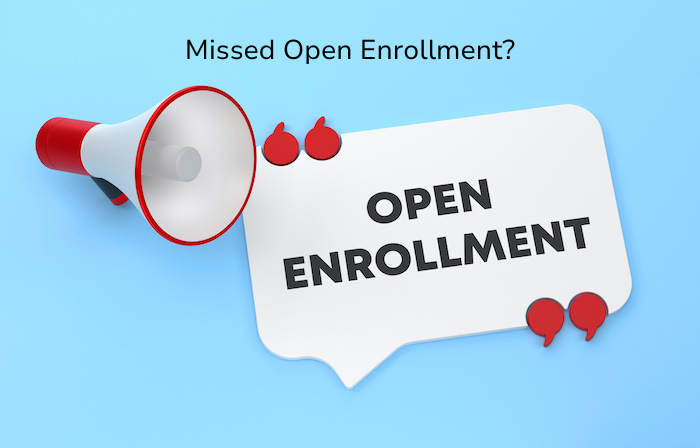Life happens, and sometimes deadlines slip through the cracks. If you’ve missed the Open Enrollment deadline for health insurance in 2024, don’t panic. We’ve got your back, and there are still options available to ensure you’re covered.
These include several alternatives such as:
- Indemnity insurance,
- Medicaid,
- Special enrollment periods, and
- Short-term plans.
Your health coverage journey extends beyond deadlines, ensuring continued protection for your well-being. In this article, we will take a closer look and your options in case you miss the open enrollment period.
Health Insurance Options After Open Enrollment
Open enrollment period is when individuals can enroll in or make changes to their health insurance plans. It serves a crucial purpose – to create a structured timeframe for people to evaluate their healthcare coverage, make necessary adjustments, and secure financial protection in the face of unforeseen medical expenses.
Missing the deadline may seem like a major headache. While options may be limited, it’s crucial to understand that all hope is not lost. If you’re without health insurance through Open Enrollment, it’s time to explore alternative avenues to safeguard your well-being.
Consider indemnity insurance as one option. Indemnity plans provide you with the flexibility to choose your healthcare providers, offering a broader network than some other plans. While premiums might be higher, the freedom to select your doctors and specialists without referrals can be a valuable asset.
Exploring Alternative Coverage
Rising premiums and your age are critical factors that should influence your decision-making. In addition, coinsurance is another key aspect to consider when selecting a health insurance plan. This cost-sharing arrangement between you and your insurer can impact your out-of-pocket expenses.
Choosing a plan with favorable coinsurance rates can help you save money in the long run. When it comes to navigating in-network benefits, prioritize providers that fall within your plan’s network. In-network services often come with lower out-of-pocket costs. This may actually end up making your healthcare more affordable.
Medicaid/CHIP
Consider Medicaid/CHIP, which offers year-round enrollment for those who qualify. If your income undergoes changes that render you eligible for Medicaid, seize the opportunity to enroll. Conversely, if you transition out of Medicaid eligibility, explore private plans to maintain continuous coverage.
Furthermore, some states also have programs with year-round enrollment. New York, Minnesota, Massachusetts, and Connecticut, among others, provide options for those seeking coverage outside the standard open enrollment window. Native Americans also have year-round access to exchange plans.
If you fall within subsidy-eligible income levels, you may qualify for a low-income special enrollment period, ensuring year-round access to coverage. The Inflation Reduction Act extends subsidy enhancements through 2025, offering a lifeline to those facing financial constraints.
The Role of Short-Term Health Insurance
In situations where traditional health insurance options are limited during special enrollment periods (or you simply missed out), it’s essential to explore alternative solutions. Enter short-term health insurance – a flexible and temporary bridge to cover the gaps in your healthcare needs.
Short-term plans, while not a substitute for comprehensive coverage, serve as a pragmatic solution for those caught in the transitional phases of life. These plans offer a safety net during times when you find yourself temporarily without coverage.
However, it’s crucial to approach short-term health insurance with a clear understanding of its limitations. You should familiarize yourself with the top health insurance companies offering in-network benefits for your short term plan to make an informed choice.
For instance, if you recently relocated for work and missed the enrollment window, a short-term plan can provide coverage until you can enroll in a more permanent solution. However, it’s crucial to know what you’re getting into. These plans may have limitations, including potential exclusions for pre-existing conditions, higher premiums, limited coverage, or more.
As you consider short-term health insurance, understanding its role as a temporary solution is essential for making informed decisions aligned with your unique circumstances.
Understanding Limits: Potential Exclusions for Pre-existing Conditions
Short-term health insurance, while providing a quick fix, comes with its set of caveats. One significant limitation lies in its potential exclusions for pre-existing conditions. Unlike comprehensive health insurance plans, short-term policies may not cover medical conditions that existed before the start of the policy.
This means that if you have ongoing health issues or pre-existing conditions, you may find yourself navigating the healthcare landscape without adequate coverage. It’s vital to carefully review the terms and conditions of any short-term plan you’re considering, ensuring you’re aware of any exclusions that may impact your specific health needs.
Discount Plans/Supplemental Policies
In the wake of all this, discount plans and supplemental policies may offer temporary solutions, albeit with limited coverage. . Discount plans typically entail membership-based programs where individuals pay a fee to access discounted rates on various healthcare services, from doctor visits to prescription medications.
Supplemental policies, on the other hand, act as add-ons to existing health insurance, covering specific gaps in your primary coverage. Examples include critical illness insurance, dental and vision plans, and accident supplements. These policies aim to enhance your overall coverage, providing additional financial support for unexpected medical expenses.
However, it’s crucial to navigate these options with a discerning eye. While discount plans and supplemental policies offer temporary relief, they often come with limitations. Coverage may be minimal, and there might be restrictions on the types of services covered. It’s imperative to thoroughly review the terms and conditions of these plans, ensuring they align with your specific healthcare needs.
Furthermore, it’s essential to recognize that discount plans and supplemental policies may not fulfill state-based individual mandates. In states where maintaining health insurance coverage is mandatory, these alternatives may not suffice. As you explore these options, carefully weigh the benefits against the limitations to make an informed decision tailored to your health and financial circumstances.
You Can Still Get Coverage
In healthcare and insurance, missing open enrollment doesn’t mean missing out on coverage completely. By exploring alternative options, understanding your needs, and staying informed, you can navigate the complex world of health insurance.
Remember, your health is the priority, and there are always avenues to protect it – even beyond open enrollment. Don’t miss the opportunity to make the most out of your healthcare coverage!
Feeling overwhelmed by post-Open Enrollment choices? Insurance Broker Hub is your guide through the maze of alternatives. Our experts can tailor solutions, offering clarity on indemnity insurance, Medicaid, special enrollment periods, short-term plans, and more. Request a quote today and safeguard your health coverage starting now!


